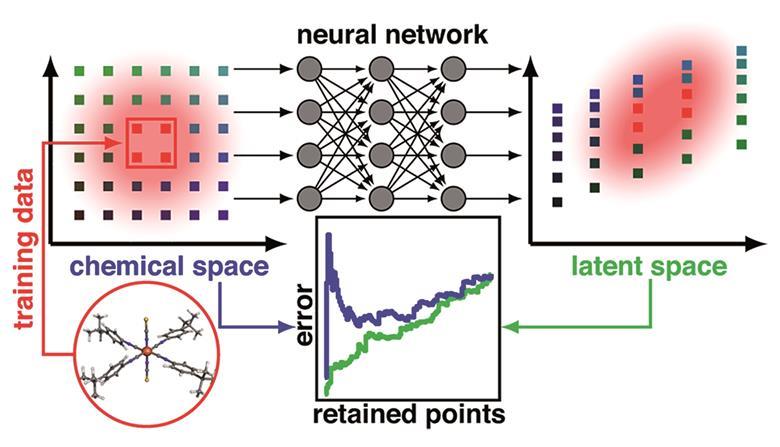Aquests dies han sortit interessants articles que involucren la intel·ligència artificial. Un i primer és el Talk to transformer, una eina curiosa que permet, començada una frase, que la IA continuï uns quants paràgrafs més. Ho he provat fins i tot amb alguna pizellada de compostos químics. Desconec l’algoritme, les dades, … de fet no sé com ho fa, ni si hi ha una persona al darrere, però que d’una frase en surtin quatre o cinc més amb una mica de sentit (i a vegades força originals) és ben curiós. Pot ser font de creativitat.
Més en relació amb la química, al Chemistry World hi ha Uncertainty metric builds confidence in machine learned-chemistry, que fa referència a les xarxes neuronals per predir nous materials, i a la seva precisió predictiva. (article al Chem. Sci.). M’agrada que es parli de fiabilitat dels resultats, i de saber aplicar o no cada mètode. Un dels principals problemes de la #artint és que costa saber si el que es prediu és gaire correcte. Al menys en aquest exemple de la química s’intenta.

The importance of measuring chemistry models’ confidence may not yet be widely appreciated. ‘If you take a look at the literature, it’s not uncommon that people make predictions with machine learning models or use them without ever really knowing how well a model will work, and how well a model will generalise,’ says Kulik. Corminboeuf says something similar: ‘Evaluating the errors associated with predictions on new molecules or conformations is clearly not yet a routine procedure, but uncertainty metrics are essential to evaluate the reliability of these predictions. They will and should be used more and more.’
Una idea semblant persegueix AI Algorithms Need FDA-Style Drug Trials publicat a Wired. Aquest article comença amb una interessant analogia:
Imagine a couple of caffeine-addled biochemistry majors late at night in their dorm kitchen cooking up a new medicine that proves remarkably effective at soothing colds but inadvertently causes permanent behavioral changes. Those who ingest it become radically politicized and shout uncontrollably in casual conversation. Still, the concoction sells to billions of people. This sounds preposterous, because the FDA would never let such a drug reach the market.
De fet, s’hi proposen “assajos mèdics digitals”:
What might these digital clinical trials look like? An oversight body would need to carry the authority of a government agency like the FDA, but also employ the depth of technical know-how found at existing technology-focused governing bodies like ICANN. It would need to house a rich diversity of expertise to grasp the breadth of society, seating psychologists and sociologists alongside programmers and economists. Because not every piece of code needs tight oversight, it would need distinct trigger points on when to review and at what level of scrutiny, similar to the ways the FDA’s powers stretch or recede for pharmaceuticals versus nutritional supplements.
L’article fa referència a la influència, potser volguda, potser involuntària, d’algoritmes d’#artint (per exemple de Facebook) sobre els seus usuaris. Per això conclou que
It will take time to create a mechanism that protects individuals and society without blocking the paths to promising new technologies. We can expect to endure more societal disruption in the interim, as commercial and political incentives continue to lead the private sector away from the types of proactive protections we need. We will be nudged further toward extremes, and hopes for an open, fruitful, and diverse discourse in the digital town square will wither. That is not good for our society nor for entrepreneurial innovation. It is in our collective interest to avoid that fate.
En definitiva: cal poder protegir les persones i la societat d’algoritmes poc ètics o fins i tot erronis, a la vegada que cal no bloquejar noves tecnologies prometedores.
Un darrer article interessant que he trobat parla de l’empleabilitat futura dels químics: Are synthetic chemists out of a job as AI meets automation?. Darrerament s’ha anat automatitzant el procés de sintetitzar nous compostos, de provar-los… Preguntant-se si això serà la fi dels químics sintètics, queda clar que no. De fet, els alliberarà de tasques rutinàries, per ser més creatius. Perquè
So systems like this will be assistants, not replacements. ‘If you have systems that can make the simple stuff, then you can begin to explore other parts of the space that we so far haven’t been able to explore because it takes us so long to get what we need to get there,’ says Jensen.
At any rate, the human chemist is not likely to be replaced any time soon. ‘These machines don’t discover,’ says Jensen. ‘If you’re going to discover new molecules in the laboratory, machines may help you to do some of the things – but you still have to have understanding of how you manipulate the chemistry.’
I és que les màquines poden fer síntesi, però no entenen el que hi ha al darrere, el per què de les coses, per què no… potser poden fer l'”i si…?”. Les màquines no fan descobertes totes solen. Les màquines hi ajuden.